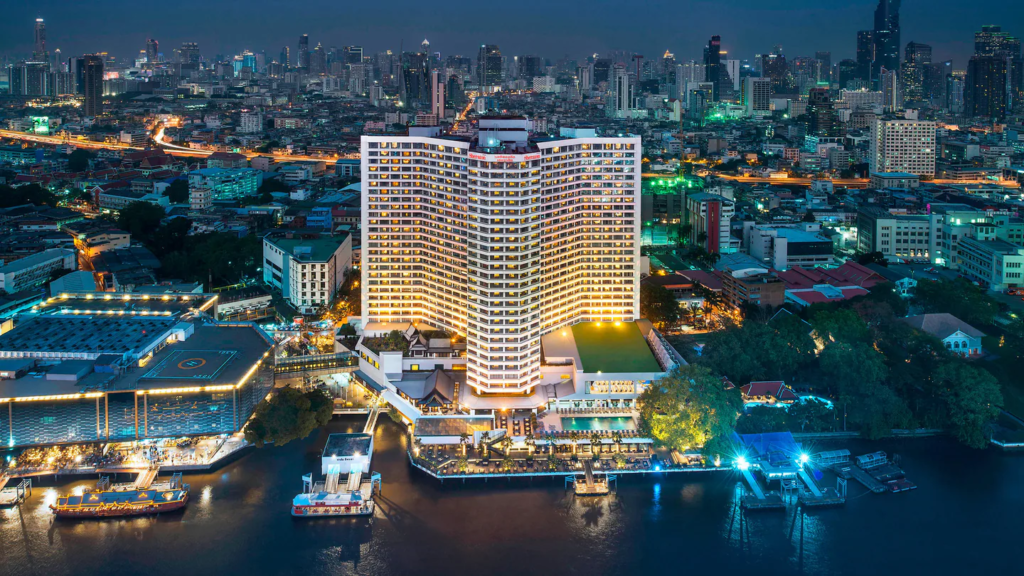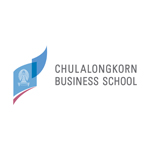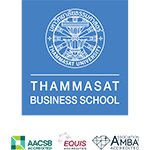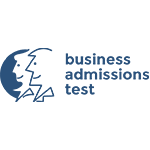The AMBA & BGA Asia Pacific Conference for Deans and Directors will take place in Bangkok, Thailand from Wednesday 15 to Friday 17 November 2023.
Join us for this three day conference which will include world-class thought leadership and two spectacular dinners, in some of the most iconic venues Bangkok has to offer.
Conference themes and programme
The conference will present, discuss and debate key issues that will impact business schools in the Asia Pacific area over the next five years and beyond. During the course of the conference the following themes will be explored:
- Best practices in business school innovation: digitalization and AI development
- Life-long learning programme development and alumni career growth
- Sustainable entrepreneurship and leadership development – the Silk Road network
- Capacity-building for industrial partnerships and eco-systems for business schools
- Approaches to “golden courses” in terms of theoretical principles and practical skills
- Responsible management and sustainability in business curriculum development
This year’s programme is now available and includes session information, timings and an outline of the overall structure of the conference.
Please note that the contents of the programme are subject to change before the event begins on November 15.
14.00 – 14.30 | Registration and networking |
14.30 – 15.00 | Conference overview and welcome Andrew Main Wilson, CEO, AMBA & BGA Somchai Supattarakul, Dean, Thammasat Business School, Thammasat University Wilert Puriwat, Dean, Chulalongkorn Business School |
15.00 – 15.45 | Session 1: Lifelong learning programme development How can business schools design and implement lifelong learning programmes that not only enrich students’ educational journey, but also foster a strong and enduring alumni community? This session will share the thoughts and experiences of renowned business educators in relation to the challenge of developing cutting-edge curricula that prepare students for the evolving demands of the business world. Speakers Raman Ramachandran, Director and Dean, K J Somaiya Institute of Management , Somaiya Vidyavihar University Arief Wibisono Lubis, Vice Dean of Academic, Research, and Student Affairs, Faculty of Economics and Business Universitas Indonesia Patrick Butler, Professor of Marketing; Director Global Executive MBA, Monash Business School, Melbourne, Australia |
15.45 – 16.15 | Networking and refreshment break |
16.15 – 16.50 | Session 2: Hyper-personalisation – how to increase programme enrolment with micro-credentials and analytics MBA programmes around the world are experiencing significant disruption, with many students opting for flexible and specialised programmes that focus on relevant, real-world skills instead of degrees with fixed curricula. How can the MBA market change to address changing demands? Could the future of degree programmes lie in a ‘build-your-own’ structure where students can pick and choose micro-degrees and skillsets that they can put together to form a personalised degree? This session will explore ways in which new technologies, such as those relating to AI and blockchain, can provide candidates with a hyper-customisable degree using micro-credentials and analytics. Speaker Zheng Wei, Co-Founder and CEO, Accredify |
16.50 – 17.25 | Session 3: ChatGPT – opportunities and pitfalls Generative AI technologies, such as that used by ChatGPT, have the power to disrupt a number of industries, including education. With a promise of enhanced learning and administrative efficiency, they are already permeating MBA programmes. While systems that make use of the technology offer unprecedented opportunities for administrators, educators and students, an excessive reliance on AI might dilute critical thinking or overshadow human-centric educational experiences. Striking the right balance is therefore crucial and implementers must discern where AI augments and where it could detract. Additionally, institutions must navigate ethical concerns and privacy risks. This session will seek to actively engage its audience in a discussion on the opportunities and potential pitfalls of integrating generative AI in MBA education. Speaker Elsamari Botha, MBA Director, University of Canterbury |
18.00 – 22.30 | Networking dinner at Scarlett Wine Bar & Restaurant in association with Thammasat Business School |
09.30 – 10.00 | Session 4: AMBA & BGA activity update and strategy presentation Speaker Andrew Main Wilson, CEO, AMBA & BGA |
10.00 – 10.35 | Session 5: Real applications, real learning, real business This session explores the Chula Business Enterprise, a real company created to synchronise teaching and learning in business school with real practice in business. It will explain how the initiative forms part of a key vision at Chulalongkorn Business School (CBS) to bring real learning, real applications and real business management to the school. The session will then outline how the initiative gives students the opportunity to run an actual business and practice the skills that they learn in class, with the role of faculty shifting from that of business educators to business facilitators. It will also demonstrate how the initiative facilitates collaborations between CBS and business enterprises, students, alumni, employers and other stakeholders, as well as how giving a portion of the revenues earned back to society is consistent with the CBS’s mission of developing students with a philanthropic spirit. Speaker Wilert Puriwat, Dean, Chulalongkorn Business School |
10.35 – 11.05 | Networking and refreshment break |
11.05 – 11.40 | Session 6: Global leadership – the shared cultural dimensions Community embeddedness, a focus on respect, conformity and future orientation are the global workplace’s four shared cultural dimensions, according to a 2020 research paper. When these shared dimensions are embraced by leaders, the paper goes on to suggest, their organisations are better able to nurture and develop their employees’ commitment. This session looks at the implications of these findings for business schools. It will make the case for ensuring that a school’s training and development programme doesn’t just focus on leaders’ communication skills, but also on their ability to understand and value these shared cultural dimensions. Speaker Professor Dr. Hassan Abu Bakar, Professor Dean, Othman Yeop Abdullah Graduate School of Business, Universiti Utara Malaysia |
11.40 – 12.15 | Session 7: Learning through community service Find out how an integrated experiential learning paradigm allows students to support community-based businesses in rural areas, while working in teams to develop their skills. This session will outline the Thammasat Model, in which faculty members at Thammasat Business School (TBS) lead groups of 120 students to address issues faced by rural businesses each year. These businesses often encounter common challenges, such as subpar product quality and design, an absence of branding, inaccurate cost estimation, improper pricing, limited distribution channels and ineffective marketing communication. It will explain how the model – which received a Silver Award for Best Lifelong Learning Initiative from AMBA & BGA in 2021 – allows teams of students and advisors to work together with local businesses and selected corporate partners to resolve these challenges. Speaker Pipop Udorn, Vice Rector for Academic Affairs, Thammasat University |
12.15 – 12.50 | Session 8: What’s missing from management programmes? The assessors’ verdict BGA’s Programme Consultancy Review is a service used by many of its member business schools across the world that identifies gaps and benchmarks their management programmes against other schools in the AMBA & BGA network. In this session, audiences will have the opportunity to learn what BGA’s assessors commonly identify as missing elements when conducting programme reviews, as well as the recommendations schools typically receive to make programmes such as the MBA more enriching and impactful for primary stakeholders. Speaker Victor Hedenberg, Membership Director, AMBA & BGA |
12.50 – 14.10 | Networking lunch |
14.10 – 14.40 | Session 9: The future of work – a LinkedIn perspective Explore global changes in the labour market since the pandemic, backed by data from LinkedIn’s vast network of more than 930 million members worldwide. This session will offer insights into the evolving demands of labour markets and the key challenges faced by companies, academic institutions and governments in managing the workforce. It will also delve into LinkedIn’s observations and predictions to provide valuable perspectives on how organisations can adapt to the dynamic landscape of work and talent. Speaker Wong Wing Kwan (Ivan), Head of Government & Academic (North Asia), LinkedIn |
14.40 – 15.10 | Session 10: Sustainable entrepreneurship and leadership development – the Silk Road network Active since 2014, the Silk Road Entrepreneurship Education Network promotes partnerships and joint initiatives among business schools through the establishment of collaborative platforms and workshops. In this session, deans and professors from business schools will present their latest progress with regards to capacity building and teaching in the areas of sustainable entrepreneurship and leadership development. This will encompass research projects, best practices and sustainable management models. The session will also promote the value of green transformation in the context of leadership development and highlight programme upgrading strategies that form part of China’s Belt and Road Initiative. Chair Zhongming Wang, international advisor for China, AMBA & BGA; director, Global Entrepreneurship Research Centre, School of Management, Zhejiang University Speakers Kenji Yokoyama, PhD, dean of external relations, NUCB Business School Jose Alves, dean, City University of Macau, China Discussion with deans from other Silk-Road network platforms |
15.10 – 15.40 | Networking and refreshment break |
15.40 – 16.10 | Session 11: Capacity-building for Developing effective business school leadership What are the implications for business school leaders of a global environment that is increasingly driven by rapid developments in relation to digital technology, sustainability and organisational change? This session will outline the new competencies required for effective business school leadership. It will also demonstrate ways in which responsible management and sustainable teaching/research practice can be developed. With a focus on capacity-building, the session will offer new insights and best practice examples for business school leadership development. Chair Steef van de Velde, Former Dean and Professor of Operations Management and Technology, Rotterdam School of Management, Erasmus University (RSM) Speakers Jorg Bley, Dean, IBSS at Xi’an Jiaotong University Liverpool in Suzhou Yusniza Kamarulzaman, Professor & Dean, Universiti Malaya Zhi Yang, Dean, School of Management, Huazhong University of Science and Technology |
16.10 – 16.40 | Session 12: Capacity-building for innovative course development in terms of theoretical principles, practical skills and employability One of the important topics of capacity-building is innovative course development in terms of knowledge points, theoretical principles and practical skills under the framework of responsible management and sustainability. More recently, sustainable employability has also become a key criterion for course development in order to facilitate the career development of students and alumni. Learn more about developing these key principles in your business schools in this session. Chair Zhongming Wang, international advisor for China, AMBA & BGA; director, Global Entrepreneurship Research Centre, School of Management, Zhejiang University Speakers Jun Qi, assistant dean, School of Management, Jinan University Xingyu Chen, vice-dean, Shenzhen University |
18.00 – 22.30 | Networking dinner at Baan Suriyasai in association with Chulalongkorn Business School |
9.30 – 10.05 | Session 13: The true meaning of internationalisation Many business schools think of internationalisation as teaching classes in English and accepting, or sending out, more international students. While these aspects are important, business schools must focus on ensuring that their research, education and even their administration have reached an international level, such that students from all over the world can receive a high-level education with peace of mind. This session will consider the true meaning of internationalisation and how it can be achieved, so that students from different countries can all be sure to receive a high-quality business management education that reflects the local context in which they have chosen to study. Speaker Kenji Yokoyama, Professor Kenji Yokoyama, PhD., Dean of External Relations, NUCB Business School |
10.05 – 10.40 | Session 14: Purposeful business schools – deepening societal impact and engagement The real purpose of business schools should be to create impact and engage with the wider community. Business education, therefore, plays a pivotal role in instilling in students a societal impact mindset that places people over profit. This session will outline some of the impact and community engagement initiatives taking place at SP Jain Institute of Management and Research, India. It will also consider ways in which business schools can adopt institutional changes that lead to a more responsible and sustainable management education. Speaker Dr. Anupama Gupta, Director – Accreditation and Rankings, S. P. Jain Institute of Management and Research (SPJIMR) |
10.40 – 11.25 | Session 15: Cultivating inclusive leadership and promoting DEI Diversity, equity and inclusion (DEI) principles are now imperative in the realm of education. Designed exclusively for institutions in the APC region, this session will explore ways of fostering inclusivity within a school’s leadership while also supporting the development of student and graduate leaders who will be powerful changemakers. It will also consider the essential characteristics and behaviours of inclusive leaders who actively champion DEI principles. Gain insights into how business schools can build a diverse leadership pipeline, create a culture of belonging and implement sustainable DEI practices by joining this session. Speakers Jenifer L. Lewis, Vice Dean, Academic Affairs & Accreditation, Nazarbayev University, Graduate School of Business Professor Sarah Kelly, Non-Executive Director, Director, Brisbane 2032 Organising Committee Board, Professor & Head of the Graduate School of Business, QUT, Sports Law, Sports Marketing & Sports Innovation, Esports, Education |
11.25 – 11.55 | Networking and refreshment break |
11.55 – 12.30 | Session 16: Perspectives on the challenges of shaping business leaders Why do more than 95 per cent of SMEs in Thailand have to close their businesses within a five-year period? Why can’t employees in organisations, the majority of whom have studied business administration and obtained an MBA, effectively transition into the role of a business leader? Is entrepreneurship a matter of innate talent? There is a significant misunderstanding between managers and entrepreneurs. In this context, entrepreneurs are those who see opportunities, take risks practise holistic management and bring about change. How can we effectively nurture the new generation of business leaders? Some say that they use their experiences, trying and failing throughout their entire lives. But in the fast-paced digital age, how can business leaders survive in the new paradigm? Suthongwan will offer suggestions and share their experiences of studying for an MBA and applying its learning through hugely successful strategy projects in both large organisations and new businesses. Given the importance of leadership today, the MBA curriculum must focus on shaping a new type of business leader in order to succeed. Speaker Surasak Suthongwan, executive assistant to the president and chairman of the board at Toyota Motor Thailand |
12.30 – 13.05 | 10 Year Accreditation Ceremony |
13.05 – 14.05 | Networking lunch |
14.30 – 18.30 (including travel time) | Networking city tour |
Conference speakers
Our speakers include some of the world’s leading deans and CEOs who will present on the issues most prevalent to business school strategy. Below you can learn more about our Asia Pacific Conference speakers ahead of the event in November.
Conference venue: Royal Orchid Sheraton Hotel & Towers
Ideally situated on the Chao Phraya River, our five-star conference venue offers our delegates unobstructed river views of Bangkok as well as access to the Si Phraya ferry dock and is only a short distance from the Wat Phra Kaew temple and the Grand Palace.
Delegates of our Asia Pacific Conference will be entitled to a preferential room rate at the Royal Orchid, for the duration of the event. For more information about this rate and to book your stay, please contact our booking agent Anita Galea.

Networking opportunities
Wednesday 15 November: networking dinner at Scarlett Wine Bar & Restaurant in association with Thammasat Business School
On Wednesday evening we will head into central Bangkok for what promises to be a memorable rooftop dining experience at the vibrant Scarlett Wine Bar and Restaurant, hosted by Thammasat Business School. Following drinks on Scarlett’s sprawling terrace with the chance to take in the spectacular skyline, guests will then make their way into the elegantly designed restaurant for dinner. Boasting a product-driven menu inspired by French cuisine, set in sleek and inviting surroundings, this will be the perfect occasion to unwind and get to know your fellow delegates.
Thursday 16 November: networking dinner at Baan Suriyasai in association with Chulalongkorn Business School
Following the second day of the conference on Thursday evening, Chulalongkorn Business School look forward to inviting you to experience the warmth and charm of old-world Thai-style hospitality in the elegantly restored 1900-era mansion. This will be a chance to savour time-tested authentic Thai dishes in graceful and serene surroundings and relax in like-minded company before the final day of the conference.

Scarlett Wine Bar & Restaurant

Baan Suriyasai
Friday 17 November: post-conference networking tour
To close the conference, we’re offering a complimentary boat tour along the Chao Phraya River to all conference attendees. While seeing Bangkok from a unique perspective, delegates will learn more about our culturally vibrant host city and have an opportunity to reconnect with contacts old and new. Details of the tour can be found below:
14:15: Pick up from the Royal Orchid Sheraton
14:30: Boats leave from Royal Orchid Sheraton pier
- 14:50: Arrive at Tha Chang Pier walk to Grand Palace and visit
- 15:30: Depart from Grand Palace walk to City Pillar Shrine and visit
- 15:45: Depart from City Pillar Shrine and walk to Wat Pho
- 16:00: Arrive at Wat Pho and visit
- 16:45: Depart from Wat Pho and ride boats across the Chao Praya River to Wat Arun
- 17:00: Arrive at Wat Arun and visit
- 18:15: Ride the boats from Wat Arun back to the hotel
18:30 Return to the Royal Orchid Sheraton.
Please note: walk times range from 5-15 minutes depending on location.
Our host schools
Conference sponsors
Want to get in contact?
If you have any questions about this conference or any of our other events, then please contact our AMBA & BGA events team.







